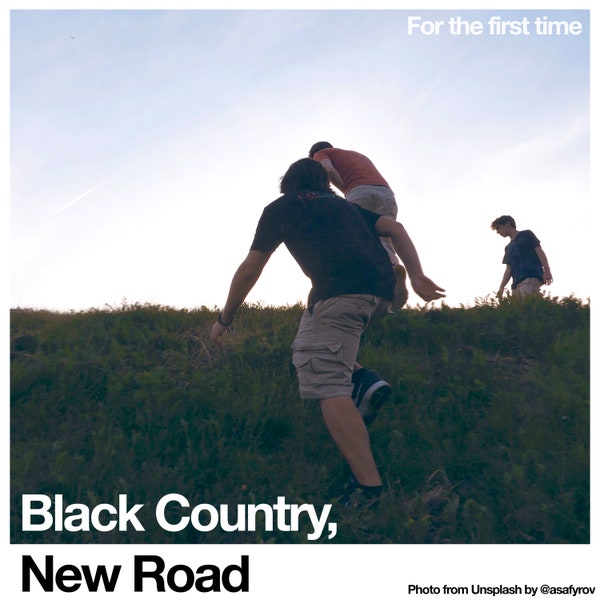Album Review: Black Country, New Road – ‘For the first time’
Posted: by The Alt Editing Staff

For those in post-punk circles, it’s been near impossible to go about your day without hearing about the band Black Country, New Road, and for good reason. The London septet, featuring vocalist/guitarist Isaac Wood, guitarist Luke Mark, bassist Tyler Hyde, drummer Charlie Wayne, keyboardist May Kershaw, violinist Georgia Ellery, and saxophonist Lewis Evans, has been on the steady rise since the January 2019 release of their debut single, “Athens, France.”
It’s instrumental, simultaneously smooth and abrasive, and featuring guitars paired with a saxophone and violin, finds a common ground between the music of Slint and Broken Social Scene, but is set apart by Wood’s hoarse, talk-sung vocals that demand attention, unlike some of their post-punk contemporaries that opt for a more monotonous and detached style. Apparent on the single is Wood’s ability to vocalize in a way that is yearning, that is crazed, that is panicked, that is angry, and intensely animated along with the music.
Such a characteristic is even more evident on the follow-up single “Sunglasses,” where he matches the music’s mood swings of melancholy and psychosis, reaching a crescendo with shouts of “I am more than adequate/Leave my daddy’s job out of this/Leave your sertraline in the cabinet/And fuck me like you mean it this time, Isaac.”
With such strong, ear-grabbing singles, anticipation for a full-length became an inevitability, and now, a year and a half later, Black Country, New Road have finally released their debut album, For the First Time. 6 songs, 41 minutes, and not a single one is wasted.
Opening the record is the aptly titled “Instrumental,” and immediately it differs from their previous work. Pulsing bass, dancing drums, the song progressively builds itself up to keyboards, guitar, saxophone, and violin joining together, and by that point, it absolutely races. Not to say that their previous songs were slow, but “Instrumental” creates a sound akin to an anxious, foreboding mariachi, unwillingly rushing into uncharted, dangerous territory. It’s a powerful, inviting start to the record, and it ensnares your senses for what’s coming.
Next is “Athens, France,” rerecorded, but also slightly rearranged to the single. Most notably, the lines “She tries to fuck me, I pretend that I’m asleep instead” and “Too soft to fuck” are replaced, along with half of the second verse. Wood has stated that the change was enacted to refine the song’s meaning, which is open to interpretation, but only he alone knows its true message. A critical analysis of Wood’s lyrics is unwarranted, but what is clear is his delivery on the rerecording is fluid, confident, and calm, especially compared to his original performance. Even musically, “Athens, France” has become more refined, and at the song’s conclusion, whereas originally a final burst of sound brought the song home, here, it takes on a lullaby-like quality, sailing away, letting the note get carried away by the wind as opposed to setting it aflame. The change is a welcome, and Black Country, New Road can improve on an already fantastic song.
“Science Fair,” the album’s lead single, heads in an upward trajectory as “Instrumental” does, but with an entirely different intensity at play. Soft, yet speedy drums and bass repeat like a loop, and the sax and violin move like ghosts. Guitars either flutter or squelch, and Wood delivers an increasingly impassioned monologue, on the verge of losing control at the end of each verse. Since the song’s beginning, you constantly feel that something’s about to happen, and when you’re afraid it’s going to come for your throat halfway through the song, it pulls itself back and a synth enters, almost taunting you. By the song’s end, Wood is shrieking, the music crescendos to an incredible outro, and you realize your heart is racing.
Opening the second side is another familiar face: “Sunglasses,” the tale of domestic discontent, refurbished. Immediately setting itself apart from its predecessor, it opens with a guitar riff, burned by distortion and mesmerizing, before leading into the song as we know it. Wood’s delivery is more melodious, more restrained, whereas on the original recording he sounded more unhinged, especially during the chaotic conclusion to the song’s first half, speaking as if he were about to crack. Now, he sings into the cacophony, seemingly oblivious of it. Most of the lyrics from the original are intact, except for what is perhaps the most famous line, “and fuck me like you mean it this time, Isaac,” from the latter half of the song. Such omissions and changes make “Sunglasses” feel more like an alternative take than an outright improvement on the original, as the line fits the unhinged and furious tone of the single, and the replacement line, “and burn what’s left of all the cards you kept,” fits the stern and incensed tone of the rerecording. Preference decides which is better, but both are undeniably hard hitting and vital.
“Track X,” the album’s second single, might be the record’s standout. All the songs are exciting, but this is chillingly heartfelt, unashamedly nostalgic. The repeating guitar, hopping sax, sweetly soothing backing vocals, searing strings, and with no drums, it’s like nothing else on the record. Whereas the references to fucking in “Athens, France” and “Sunglasses” were excised, the line “in the same room where we fucked as kids” resides here unaltered. But where the removed lines from the aforementioned songs could be perceived as chauvinist, the line of “Track X” reads as nostalgic and honest as the rest of the song, in its recollection of lost love. Also present is what may be the most unforgettable line on the album: “Dancing to Jerskin, I got down on my knees/I told you I loved you in front of black midi.” Despite it being almost 5 minutes long, “Track X” almost seems to vanish too soon. Like the narrator, you’re sad to see something beautiful leave so soon, and with “Track X,” it needs to be heard to be felt.
Here to close the curtains is “Opus,” with guitar, sax, and violin wearily sauntering into frame, before an abrupt about-face by the guitar leads the entire band into a rushed frenzy. Right before the verses, the band almost tires out, and resumes the melancholic and weary sound of the introduction, as Wood meditates on the end of a shared past, a shared love. As soon as he finishes, though, the band returns on all cylinders, as if meaning to represent the different sides of an end—the sorrowful, slow burn, and the chaotic collapse. By the end, both sides join to set it all alight as Wood wails, “What we built must fall to the rising flames.” The smoke briefly clears as the intro returns as the outro, and the final embers lose their glow and dissipate to ash. You’re left choking and lost for breath. Such is the end of the record.
By the record’s end, you release the title, For the first time, has multiple meanings. Most obviously, it could refer to the fact that it is the band’s first album, but after listening, you gather it refers to first love, feeling such a strong connection to someone for the very first time, and how, unfortunately, it doesn’t always work out. Black Country, New Road are masters of feeling and make it clear when the highs are high, and when the lows are low. Listening to this album, you feel you’ve had years’ worth of personal history crammed into your mind, yet you don’t feel cluttered, and you’re shocked the album is as short as it is. For the first time is a spellbinding debut from one of the most unique bands out there today, and one that doesn’t feel like a peak, leaving you craving more. And there is truly nothing like hearing it for the first time.
Disappointing / Average/ Good / Great / Phenomenal
—
David A. Gutierrez | @dagewts
The Alternative is ad-free and 100% supported by our readers. If you’d like to help us produce more content and promote more great new music, please consider donating to our Patreon page, which also allows you to receive sweet perks like free albums and The Alternative merch.










